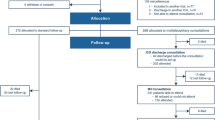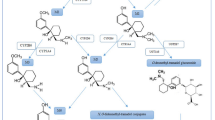Abstract
Purpose of Review
Delirium is associated with high morbidity, mortality and healthcare costs, and longer inpatient hospital length of stays. The purpose of this review is to summarize the most recent evidence pertaining to the recognition, prevention, and management of delirium to help guide clinicians to make evidence-based decisions in patient care.
Recent Findings
Delirium is best managed with a multicomponent strategy using standardized tools for early recognition, such as the Confusion Assessment Method (CAM), non-pharmacologic interventions including restoration of the natural sleep-wake cycle with environmental management of light and noise, facilitating early mobility, and providing assistive devices such as eyeglasses and hearing aids. Medical optimization includes recognizing and treating medical problems, ensuring adequate nutrition, avoiding excessive testing and lines/catheters, and avoiding polypharmacy. Despite widespread use, there are insufficient data to support the use of antipsychotics to prevent or treat delirium.
Summary
A multicomponent strategy using a team-based approach to delirium recognition, prevention, and management employed consistently can improve patient care while reducing healthcare costs.
Similar content being viewed by others
References
Papers of particular interest, published recently, have been highlighted as: • Of importance •• Of major importance
Kiely DK, Bergmann MA, Murphy KM, Jones RN, Orav EJ, Marcantonio ER. Delirium among newly admitted postacute facility patients: prevalence, symptoms, and severity. J Gerontol A Biol Sci Med Sci. 2003;58(5):M441–5.
Nydahl P, Bartoszek G, Binder A, Paschen L, Margraf NG, Witt K, et al. Prevalence for delirium in stroke patients: a prospective controlled study. Brain Behav. 2017;7(8):e00748. https://doi.org/10.1002/brb3.748.
Girard TD, Thompson JL, Pandharipande PP, Brummel NE, Jackson JC, Patel MB, et al. Clinical phenotypes of delirium during critical illness and severity of subsequent long-term cognitive impairment: a prospective cohort study. Lancet Respir Med. 2018;6(3):213–22. https://doi.org/10.1016/S2213-2600(18)30062-6.
Brummel NE, Boehm LM, Girard TD, Pandharipande PP, Jackson JC, Hughes CG, et al. Subsyndromal delirium and institutionalization among patients with critical illness. Am J Crit Care. 2017;26(6):447–55. https://doi.org/10.4037/ajcc2017263.
Ma IC, Chen KC, Chen WT, Tsai HC, Su CC, Lu RB, et al. Increased readmission risk and healthcare cost for delirium patients without immediate hospitalization in the emergency department. Clin Psychopharmacol Neurosci. 2018;16(4):398–406. https://doi.org/10.9758/cpn.2018.16.4.398.
Vasilevskis EE, Chandrasekhar R, Holtze CH, Graves J, Speroff T, Girard TD, et al. The cost of ICU delirium and coma in the intensive care unit patient. Med Care. 2018;56(10):890–7. https://doi.org/10.1097/MLR.0000000000000975.
Mudge AM, McRae P, Hubbard RE, Peel NM, Lim WK, Barnett AG, et al. Hospital-associated complications of older people: a proposed multicomponent outcome for acute care. J Am Geriatr Soc. 2019;67(2):352–6. https://doi.org/10.1111/jgs.15662.
Marcantonio ER, Kiely DK, Simon SE, John Orav E, Jones RN, Murphy KM, et al. Outcomes of older people admitted to postacute facilities with delirium. J Am Geriatr Soc. 2005;53(6):963–9.
Oh-Park M, Chen P, Romel-Nichols V, Hreha K, Boukrina O, Barrett AM. Delirium screening and management in inpatient rehabilitation facilities. Am J Phys Med Rehabil. 2018;97(10):754–62. https://doi.org/10.1097/PHM.0000000000000962.
Freter S, Koller K, Dunbar M, MacKnight C, Rockwood K. Translating delirium prevention strategies for elderly adults with hip fracture into routine clinical care: a pragmatic clinical trial. J Am Geriatr Soc. 2017;65(3):567–73. https://doi.org/10.1111/jgs.14568.
Vasunilashorn SM, Fong TG, Albuquerque A, Marcantonio ER, Schmitt EM, Tommet D, et al. Delirium severity post-surgery and its relationship with long-term cognitive decline in a cohort of patients without dementia. J Alzheimers Dis. 2018;61(1):347–58. https://doi.org/10.3233/JAD-170288.
Berger M, Oyeyemi D, Olurinde MO, Whitson HE, Weinhold KJ, Woldorff MG, et al. The INTUIT study: investigating neuroinflammation underlying postoperative cognitive dysfunction. J Am Geriatr Soc. 2019. https://doi.org/10.1111/jgs.15770.
Fann JR, Roth-Roemer S, Burington BE, Katon WJ, Syrjala KL. Delirium in patients undergoing hematopoietic stem cell transplantation. Cancer. 2002;95(9):1971–81.
Doriath V, Paesmans M, Catteau G, Hildebrand J. Acute confusion in patients with systemic cancer. J Neuro-Oncol. 2007;83(3):285–9.
Inouye SK, Zhang Y, Jones RN, Kiely DK, Yang F, Marcantonio ER. Risk factors for delirium at discharge: development and validation of a predictive model. Arch Intern Med. 2007;167(13):1406–13.
•• Morrison RS, Magaziner J, Gilbert M, Koval KJ, McLaughlin MA, Orosz G, et al. Relationship between pain and opioid analgesics on the development of delirium following hip fracture. J Gerontol A Biol Sci Med Sci. 2003;58(1):76–81. This is a landmark study which supports a proactive approach in treating pain with opioids as a means of reducing indecent delirium in patients following a hip fracture.
Garpestad E, Devlin JW. Polypharmacy and delirium in critically ill older adults: recognition and Prevention. Clin Geriatr Med. 2017;33(2):189–203. https://doi.org/10.1016/j.cger.2017.01.002.
Hein C, Forgues A, Piau A, Sommet A, Vellas B, Nourhashémi F. Impact of polypharmacy on occurrence of delirium in elderly emergency patients. J Am Med Dir Assoc. 2014;15(11):850.e11–5. https://doi.org/10.1016/j.jamda.2014.08.012.
•• American Geriatrics Society Beers Criteria® Update Expert Panel. American Geriatrics Society 2019 updated AGS beers criteria® for potentially inappropriate medication use in older adults. J Am Geriatr Soc. 2019, 2019;67:674–94. https://doi.org/10.1111/jgs.15767. This is the most commonly cited consensus resource for high risk medications in older adults, many of which can be contributors to the development of delirium.
Yanamadala M, Wieland D, Heflin MT. Educational interventions to improve recognition of delirium: a systematic review. J Am Geriatr Soc. 2013;61(11):1983–93. https://doi.org/10.1111/jgs.12522.
Jones RN, Cizginer S, Pavlech L, Albuquerque A, Daiello LA, Dharmarajan K, et al. Assessment of instruments for measurement of delirium severity: a systematic review. JAMA Intern Med. 2019;179(2):231–9. https://doi.org/10.1001/jamainternmed.2018.6975.
•• Inouye SK, van Dyck CH, Alessi CA, Balkin S, Siegal AP, Horwitz RI. Clarifying confusion: the confusion assessment method. A new method for detection of delirium. Ann Intern Med. 1990;113(12):941–8. This is the article which introduced a systematic approach to assess for the presence of delirium which has become a gold-standard in clinical practice.
• Tobar E, Alvarez E, Garrido M. Cognitive stimulation and occupational therapy for delirium prevention. Rev Bras Ter Intensiva. 2017;29(2):248–52. https://doi.org/10.5935/0103-507X.20170034. This is one of the few prevention studies to first describe the positive impact of occupational therapy in reducing delirium incidence.
•• Schweickert WD, Pohlman MC, Pohlman AS, Nigos C, Pawlik AJ, Esbrook CL, et al. Early physical and occupational therapy in mechanically ventilated, critically ill patients: a randomised controlled trial. Lancet. 2009;373(9678):1874–82. https://doi.org/10.1016/S0140-6736(09)60658-9. This is one of the few studies to first describe the positive impact of rehabilitation services to patients receiving ventilator support with a marked reduction in incident delirium.
•• Hshieh TT, Yang T, Gartaganis SL, Yue J, Inouye SK. Hospital elder life program: systematic review and meta-analysis of effectiveness. Am J Geriatr Psychiatry. 2018;26(10):1015–33. https://doi.org/10.1016/j.jagp.2018.06.007. This is a landmark article to comprehensively describe the evidence supporting a hospital-implemented proactive strategy to decrease incident delirium.
Marcantonio ER, Bergmann MA, Kiely DK, Orav EJ, Jones RN. Randomized trial of a delirium abatement program for postacute skilled nursing facilities. J Am Geriatr Soc. 2010;58(6):1019–26. https://doi.org/10.1111/j.1532-5415.2010.02871.x.
• Oh ES, Fong TG, Hshieh TT, Inouye SK. Delirium in older persons: advances in diagnosis and treatment. JAMA. 2017;318(12):1161–74. https://doi.org/10.1001/jama.2017.12067. This is one of the most current comprehensive summary to outline an array to assessment methods and approaches to the treatment of delirium.
• Zayed Y, Barbarawi M, Kheiri B, Banifadel M, Haykal T, Chahine A, et al. Haloperidol for the management of delirium in adult intensive care unit patients: a systematic review and meta-analysis of randomized controlled trials. J Crit Care. 2019;50:280–6. https://doi.org/10.1016/j.jcrc.2019.01.009. This is the most comprehensive review to demonstrate the lack of evidence for effectiveness of haloperidol for treatment of delirium in the intensive care setting.
Girard TD, Exline MC, Carson SS, Hough CL, Rock P, Gong MN, et al. Haloperidol and ziprasidone for treatment of delirium in critical illness. N Engl J Med. 2018;379(26):2506–16. https://doi.org/10.1056/NEJMoa1808217.
• Agar MR, Lawlor PG, Quinn S, Draper B, Caplan GA, Rowett D, et al. Efficacy of oral risperidone, haloperidol, or placebo for symptoms of delirium among patients in palliative care: a randomized clinical trial. JAMA Intern Med. 2017;177(1):34–42. https://doi.org/10.1001/jamainternmed.2016.7491. This study examined common antipsychotic medications used in palliative care settings and showed relative lack of effectiveness in outcomes.
• Hui D, Frisbee-Hume S, Wilson A, Dibaj SS, Nguyen T, De La Cruz M, et al. Effect of lorazepam with haloperidol vs haloperidol alone on agitated delirium in patients with advanced cancer receiving palliative care: a randomized clinical trial. JAMA. 2017;318(11):1047–56. https://doi.org/10.1001/jama.2017.11468. This study demonstrated a reduction in delirium symptoms using sedating medications but not with antipsychotic medications.
Author information
Authors and Affiliations
Corresponding author
Ethics declarations
Conflict of Interest
The authors declare that they have no conflict of interest.
Human and Animal Rights and Informed Consent
This article does not contain any studies with human or animal subjects performed by any of the authors.
Additional information
Publisher’s Note
Springer Nature remains neutral with regard to jurisdictional claims in published maps and institutional affiliations.
This article is part of the Topical Collection on Geriatric Rehabilitation
Rights and permissions
About this article
Cite this article
Caprio, T.V., Morrison, E.J. & Poduri, K.R. Delirium: Evaluation and Management. Curr Phys Med Rehabil Rep 7, 134–140 (2019). https://doi.org/10.1007/s40141-019-00223-w
Published:
Issue Date:
DOI: https://doi.org/10.1007/s40141-019-00223-w




